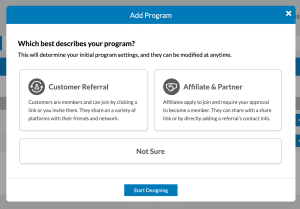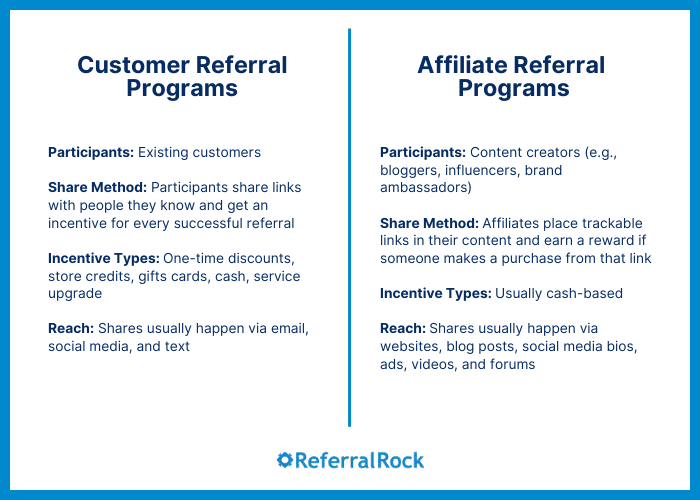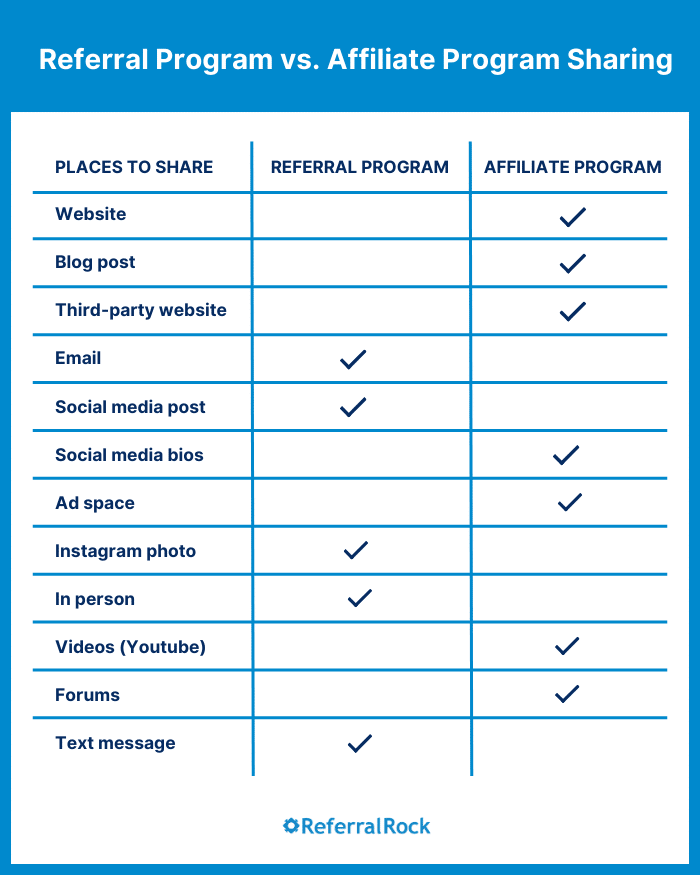There’s lots of confusion about affiliate marketing vs. referral marketing.
What makes a referral program different from an affiliate program?
Referral programs encourage your current customers to share your brand with their friends in exchange for rewards. Meanwhile, affiliate programs encourage third-party content creators to share your brand with their audiences, and give out cash commissions when these creators drive sales.
Today, we’ll explore what makes affiliate marketing different from referral marketing in detail, what similarities both marketing programs share, and how to decide which program to start.
What is a referral program?
A referral program offers existing customers a reward each time they successfully refer someone they know to your company. These rewards vary by company, and may include discounts, store credits, gift cards, free products, or service upgrades.
In a referral marketing program, the customer (or advocate) shares a unique referral link with family and friends, which traces every referral back to that customer. When a referred friend makes their first purchase, the advocate earns the incentive as a thank you for bringing in the new business.
The best-performing referral programs are double-sided, which means they reward both the existing customer and the newly referred customer. The reward can be the same for both parties (e.g. give $10, get $10), or different (e.g. a $50 gift card for the advocate, a 10% discount for the new customer).
The Dropbox referral program invites customer sharing with free space for referrers and their friends.
What is an affiliate program?
An affiliate program compensates content creators (bloggers, influencers, brand ambassadors, and other partners) for any new customers they bring in. Affiliates place trackable affiliate links within their content. If one of their readers or followers clicks the affiliate link and makes a purchase, the responsible affiliate earns a reward.
Affiliate program rewards are called commissions, and are almost always cash-based. Affiliates could receive a flat fee commission payout for each sale, a percentage of the first sale, or a recurring percentage (if the product is a monthly subscription).
Leadpages offers a percentage cash commission to creators who join their affiliate program.
Differences between referral and affiliate programs
In a referral program, your existing customers share your brand with family and friends (people they know) to earn rewards.
Meanwhile, an affiliate partner does not have to be an existing customer of yours. Rather, an affiliate is a third-party creator who shares your business within their content (e.g. social media, blog posts) and receives commissions on new sales. Affiliates must have an audience that matches your company’s target market. But many members of this audience are people the affiliate doesn’t know personally.
Let’s take a deeper dive into these differences, to help you figure out which program will work best for your brand.
1. The individual referring new customers
The individuals invited to join an affiliate program vs. a referral program are vastly different:
| Referral programs | Affiliate programs |
Advocates in a referral program already know and love your products, and want to share the awesome experience they’ve had. |
Affiliates don’t have to be familiar with your products or services before they become affiliates. But if they haven’t used your products before, it’s a good idea to let them try your products for authentic promotion. |
2. The relationship with the potential customer
Another big difference is the type of relationship between the person who is referring (the affiliate or customer) and the person being referred to the business (the potential new customer).
| Referral programs | Affiliate programs |
| In referral marketing, there’s an existing relationship between the customer and the referral, and the recommendation is personal.
Customers will refer friends, family, or colleagues to your business. The existing relationship and trust between parties is what leads to a successful referral. |
In affiliate marketing, the person who clicks the affiliate link usually doesn’t know the affiliate personally.
For example, most subscribers to a YouTube channel, newsletter, or podcast don’t know the host. Still, they trust the creator’s recommendations based on the quality of the content and the expertise the creator has. |
3. How the program is shared
The strategies for sharing these two types of reward programs are slightly different. Referral programs usually take a more direct approach, whereas affiliate programs rely on people landing on an affiliate page.
| Referral programs | Affiliate programs |
| Referral programs have a more specific, intentional approach. Most messages are sent to friends and family through direct channels, such as email, text, or social media messages.
This personal customer engagement usually results in a higher chance of the person making a purchase. |
Affiliate programs involve promotions on public channels, within related content the affiliate creates. It’s as simple as including a link on the affiliate marketer’s site, newsletter, or social media post. This means that affiliate sharing has a wide reach: one affiliate link can reach a large audience all at once. |
What’s the difference between an affiliate link and a referral link?
Both affiliate links and referral links are used to track any new lead or customer/sale that comes from a program participant. As soon as an affiliate or customer signs up to your program, they’re given a unique link they can use to invite others to visit your website or product page. This link contains a unique code that traces sales made through the link back to the person who shared the link.
The key difference between affiliate links and referral links is where they’re shared. An affiliate link is published to the public, usually through a website, blog post, or social media posts or bios.
A referral link is typically sent as a direct message from person to person (although providing message templates can make the sharing much easier).
4. The types of rewards
Rewards are the ultimate driving factor in both referral programs and affiliate programs. Even if someone really loves your business and already shares it organically, an attractive incentive will keep them motivated to refer others.
Rewards can vary greatly across different affiliate vs. referral programs. Programs can choose between giving one-time rewards, recurring rewards, tiered rewards, and more.
But there’s one key difference between rewards in affiliate vs. referral programs – affiliates generally expect cash as their reward. Meanwhile, there are lots of different types of referral rewards you could offer in a referral program, including cash, gift cards, store credits, discounts, upgrades, and swag.
| Referral programs | Affiliate programs |
| Popular incentives for a referral program include discount coupons, store credit, free products, cash back, or gift cards.
Rewards can also be given to only the existing customer (the one referring others), the new customer (the referral), or both (a dual-sided or 2-sided incentive). |
Affiliate programs typically incentivize affiliates with cash-based commissions, in the form of a flat fee or percentage of each sale.
It’s also common for affiliates to get free products on top of their cash compensation, especially if they perform well or have been affiliated with the company for a while. |
5. The reach of the program
What’s your priority: to bring in lots of new customers to quickly scale your brand, or bring in higher-quality customers over a longer timeframe? This will also influence whether an affiliate or referral program is a better fit.
| Referral programs | Affiliate programs |
| A referral program works well for bringing in high-quality customers, because people trust peer recommendations. But each customer only knows so many people who could benefit from your business, so referred customers may come in more gradually.
Referral programs are generally more accessible to smaller businesses because of this, but you’ll first need customers who are willing to refer you. |
Affiliate programs are more focused on scaling your business quickly, since affiliates reach their wide audience of followers all at once.
As you’ll need to pay out commissions for every sale and you’ve got the potential to scale quickly, affiliate programs are more suited for larger and more established brands. |
Similarities between referral and affiliate programs
While affiliate programs and referral programs have their differences, they do share a few similarities. The biggest similarity is they both encourage others to promote a brand and typically offer an incentive for every sale.
Below are a few other ways affiliate programs and referral programs are alike.
1. They rely on the trust factor
Both programs are based on inviting others to become new customers. Whether that invite comes from an existing customer or an affiliate, it naturally involves a level of trust.
| Referral programs | Affiliate programs |
| Since referrals come from existing customers, there’s an implied guarantee the product or service is good. After all, they’ve already tried it themselves.
When a customer refers their family and friends, it’s assumed that the product is worth trying and will work for them, too. |
In affiliate marketing, the link is placed on a public platform, like a blog post, landing page, or an online video.
Visitors decide to click on the link based on trust and the affiliate’s reputation. |
2. They’re both repeatable marketing strategies
Both affiliate programs and referral programs are intended to drive consistent growth. They rely on brand advocates to share your business, generate word of mouth, and help bring in new leads and sales.
| Referral programs | Affiliate programs |
| A referral program build a long-term meaningful relationship with your customer, inviting them to share with their friends and rewarding them for their efforts.
Referral campaigns may not see much traffic as an affiliate program. But they do generate higher-quality leads, higher conversion rates, higher customer retention rates, and a higher average customer lifetime value. |
Affiliates include their links in engaging content, such as high traffic blogs or posts on their social network.
Even if there’s no direct communication with potential customers, these affiliate links are easily clicked by anyone with an existing interested in your product or service. |
3. They’re both cost-effective
Assuming you use referral software or affiliate software –and not an affiliate network – referral and affiliate programs are much more cost-effective than other marketing methods.
Both programs also carry a much lower financial risk than paying for ads, as they are performance-based. With referral and affiliate marketing, you only pay when you see results (you only give rewards when a sale is made or lead is qualified).
| Referral programs | Affiliate programs |
| With a referral program, you’ll pay once for referral software, and then you’ll only pay when a customer’s referral results in a purchase (or qualified lead).
You also have full control over the value and types of rewards you offer. Although both programs are cost-effective, referral programs are more affordable to set up than affiliate programs. |
With an affiliate program (run with affiliate software), you’ll only pay once for the software, and then you’ll only pay when someone clicks an affiliate link and makes a purchase (or is qualified as a lead).
Although you’ll need to pay an affiliate in cash, you’ll have full control over the commission amount. |
Pros and cons of each program type
Still need to know more? Compare the advantages and disadvantages of referral vs. affiliate programs below.
| ✅ Pros of referral programs | ✖️ Cons of referral programs |
|
|
And now, here are the pros and cons of affiliate programs:
| ✅ Pros of affiliate programs | ✖️ Cons of affiliate programs |
|
|
How to choose the right program for your needs?
Now that you know the basics of referral program vs affiliate program, and you’ve compared the advantages and disadvantages, you’re ready to find the best one for your business. To help with your decision, we break down which type of program to consider for your industry. (As you can see in the table below, some businesses can see success with running both a referral program and an affiliate program!)
| Business type | Referral program | Affiliate program |
| Ecommerce/ Online store | Ecommerce referral programs work well for any online store (see this case study as an example) | An ecommerce affiliate program works very well if products have higher profit margins |
| SaaS (B2C) | Great for showing customers appreciation with a reward, and bringing in new users who tend to stick with your SaaS | Works well if you know creators who use your SaaS, but since price points are generally lower, it might not attract many other affiliates |
| SaaS (B2B) | Works well as long as you provide attractive incentives (particularly for high-ticket products or services) | Great for high-transaction sales with no sales person. (It can be pricey to compensate both an affiliate and a salesperson.) |
| Other B2B | B2B referral programs are a great choice if you use multi-step rewards (incentives for qualified leads and sales) to keep customers motivated to share | Works well if you can recruit B2B experts as your affiliates |
| Other subscription services (online courses, paid content, etc.) | Awesome for getting existing loyal subscribers to bring in new loyal subscribers | Great choice, especially if you’re ready to offer recurring commissions on renewals |
| Local service businesses | Great for services with higher price points, recurring fees, or monthly payments | Difficult for offline businesses bound by specific locations or those with longer sales cycles — but instead of affiliates, you could go for a channel partner strategy (example). |
| Consulting or coaching services | Can be good, but a service that’s too niche will have a lower volume of potential referrals | Great, but the sales process can be tougher to track electronically |
| Gyms | Great way to give credits or discounts to customers, and build loyalty | Can be difficult to target local leads through affiliate links.
But there could be an opportunity for channel partners (e.g. dieticians, nutritionists, physiotherapists, etc.) |
In addition to the type of business you run, ask the following questions when choosing your program type:
Do your products appeal to a wider target audience, or are they more niche? Referral marketing works better for niche businesses. But if your company has a wider audience appeal, affiliate marketing can help you rapidly scale.
Are you an established business or a newer business? Newer businesses might have trouble recruiting content creators for an affiliate program. Referral programs are far more accessible to newer businesses, as long as your business has built up a base of happy customers. If you’re more established, both programs could work for you, but affiliate programs offer quicker growth.
Can you afford commissions on every sale? If your business isn’t ready for the consistent cash payouts that an affiliate program requires, you can start a referral program first.
Who do you want to mobilize as advocates? Referral programs mobilize current loyal customers to tell their friends about you, while affiliate programs harness the power of trusted content creators. Of course, you can always get the best of both worlds if you’d like to (and are able to) run both types of programs.
Run referral and affiliate programs with Referral Rock
Whether you’ve decided that a referral program or affiliate program (or both!) will work best for you, Referral Rock can help you set one up quickly.
With our Program Template Picker, whenever you start a new program, you can choose between a Customer Referral Program and an Affiliate/Partner Program. Picking a program type will determine your initial program settings and give you a template for building your program based on your needs.
If you decide that a different type of program better suits your business, you can switch your settings at any time. Plus, run a referral and affiliate program simultaneously, with the right settings for each, if you choose.

No matter which program you’d like to run, Referral Rock lets you choose from a variety of reward types and structures, for maximum flexibility. Offer cash payouts, gift cards, coupons, or any custom rewards. And set up tiered, multi-step, or recurring rewards if you desire, for added motivation.
Here’s more on how Referral Rock can help you launch a referral program > or start an affiliate program >
Referral program vs affiliate program: What’s next for you?
Referral programs and affiliate programs are both great ways to grow your customer base through an existing network. While they’re both based on word-of-mouth marketing, each specific type of program has the potential to help your business in different ways.
If you’re considering a referral program or an affiliate program – or both! – having the right software tool can help you get started (and track key word-of-mouth metrics with ease).
With Referral Rock, you don’t have to worry about managing your referrals or trying to build a program in-house. Launch and promote a referral or affiliate program that makes sense for your business, and integrate seamlessly with your CRM or e-commerce platform.
- Learn more about how to build a customer referral program or affiliate marketing program with software.
- Read this customer story, where FeedXL started two referral programs: one for customers and one for partners.








